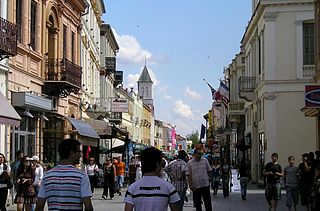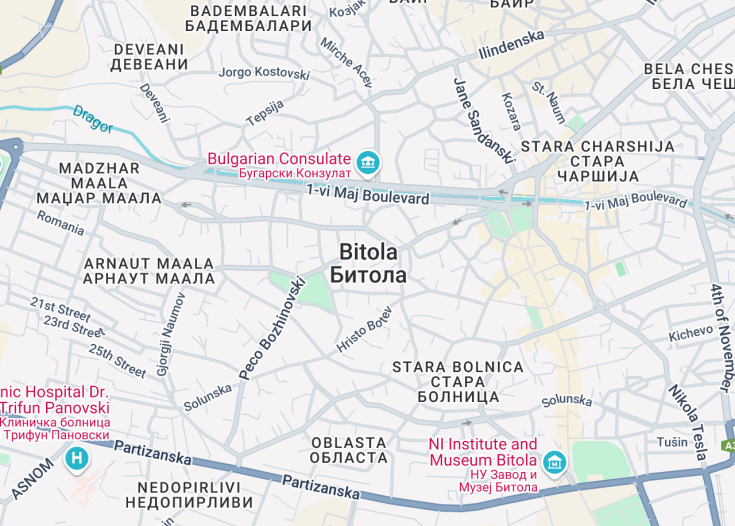Bitola, North Macedonia’s second-largest city, is a captivating destination steeped in history and culture. Nestled at the foot of the Pelister Mountains, it boasts a blend of ancient and contemporary, from its Ottoman-era bazaar and classical architecture to stylish cafes and galleries.
The city is an ideal starting point for exploring the stunning Pelister National Park and its diverse ecosystems. Bitola also enjoys a vibrant atmosphere with its many festivals, notably the renowned Manaki Brothers Film Festival. Its rich past as a center of diplomacy during the Ottoman Empire still resonates through the consulates and cultural institutions that dot the city.
To make the most of your visit to Bitola, start with a guided tour of the ancient city of Heraclea Lyncestis, a remarkably preserved archaeological site just outside the modern city.
Be sure to try local dishes like tavče gravče and Bitolsko brašno at traditional restaurants in Bitola’s old bazaar to experience the city’s unique culinary offerings.
Top things to do & see in Bitola
Select the following sights and activities to discover best tickets and tours available in Bitola.
Bitola: The City of Consuls
| Country | North Macedonia |
| Time in Bitola | GMT+2 |
| Language spoken | Macedonian |
| Population | 74,550 (State Statistical Office, 2021) |
| Currency | Macedonian denar (MKD) |
| Airports |
|
Bitola, located in the south of North Macedonia, is a city with a rich history and cultural significance. As the second-largest city in the nation, Bitola is affectionately known as the “City of Consuls” due to its historical role as a diplomatic center with numerous consulates. Established over millennia ago, Bitola has been pivotal in regional history, influenced by Byzantine, Ottoman, and modern Macedonian periods. It’s renowned for its old-world charm, with streets lined with neoclassical buildings, manicured gardens, and the ancient ruins of Heraclea Lyncestis just on its outskirts.
Bitola is home to several cultural festivals, including the renowned Manaki Brothers Film Festival, celebrating cinematography and film achievements. Historically, it has been a focal point for commerce and culture, drawing both tourists and scholars interested in Balkan history. The city hosts Shirok Sokak, a bohemian street filled with cafes and shops, offering a vibrant social scene.
The architecture in Bitola reflects its diverse cultural heritage, with the juxtaposition of Ottoman-influenced designs, romantic 19th-century buildings, and modernist 20th-century structures. This eclectic blend allows visitors a visual journey through time, making it a unique destination for architecture enthusiasts. Further, the city’s proximity to Pelister National Park provides nature lovers with abundant recreational opportunities such as hiking, skiing, and exploring diverse flora and fauna, including the rare Molika pines.
Bitola also holds strategic economic importance due to its geographic position near major trade routes and borders with Greece and Albania. Its location enhances its appeal as a gateway for exploring the greater Balkan area, making it a bustling hub filled with various cultural, historical, and natural attractions.
Where is Bitola?
Bitola sits in the southern part of North Macedonia, near the Greek border.
Distances:
| Route | Distance by car | Time by car |
|---|---|---|
| Skopje to Bitola | 109 miles (175 km) | Approx. 2 hours |
| Ohrid to Bitola | 45 miles (72 km) | Approx. 1 hour |
What is Bitola famous for?
Bitola is renowned for its historical significance as a diplomatic hub hosting numerous foreign consulates during the 19th and early 20th centuries. It is also known for its well-preserved ancient ruins and vibrant cultural scene.
History
Ancient and Roman Periods (before 4th century AD)
The history of Bitola begins with the ancient settlement known as Heraclea Lyncestis, founded by Philip II of Macedon in the middle of the 4th century BC. Situated strategically near important routes connecting the Adriatic Sea to the Aegean Sea, Heraclea became a significant urban center, evidenced by the magnificently preserved Roman theater and fine floor mosaics dating from the period when it served as an important station on the Via Egnatia trade route.
Ottoman Era (14th century – 1912)
Bitola’s prominence continued into the Ottoman period, when it was known as Monastir. It experienced significant growth as a cultural and economic hub, becoming renowned for its numerous consulates and bustling markets. During this era, many of the city’s most notable mosques and other architectural landmarks were established, and it became an influential center of Islamic culture and learning in the Balkans.
The 20th Century and Beyond
Throughout the 20th century, Bitola was impacted by both World Wars and the shifting political landscape of the Balkan region. The city saw substantial development during the Yugoslav period and has continued to evolve since Macedonia gained independence in 1991. Today, Bitola is celebrated for its historical architecture, educational institutions, and vibrant cultural scene, maintaining its status as a key city in North Macedonia.
Visit Bitola
What to see and do in Bitola
Bitola, a city rich in history and culture, offers visitors a plethora of sights and activities. Explore the ancient ruins of Heraclea Lyncestis, walk through the bustling Shirok Sokak street, or visit the Bitola Museum housed in the old military academy where Mustafa Kemal Atatürk studied.
Nature enthusiasts can enjoy Pelister National Park, perfect for hiking and observing diverse flora and fauna.
- Heraclea Lyncestis
- Shirok Sokak street
- Bitola Museum
- Pelister National Park
Festivals and Events in Bitola
Bitola is a city that celebrates various cultural and artistic events throughout the year. The Bitola Shakespeare Festival is one of the highlights, attracting international theater groups every summer. Additionally, the International Camera Festival “Manaki Brothers” celebrates film and photography each fall, honoring the pioneer Balkan cinematographers.
Best time to visit Bitola
Bitola can be visited year-round, but the best time to travel is between late spring and early autumn. During these months, the weather is pleasant, and the city hosts most of its cultural events, providing visitors with an enriching experience of local traditions and vibrant atmosphere.
Is Bitola worth visiting?
Indeed, Bitola is absolutely worth visiting. Its rich tapestry of history, combined with a vibrant cultural life and the natural beauty of its surroundings, makes it a unique destination.
Whether one is interested in ancient history, enjoys exploring outdoor activities, or is a fan of the arts, Bitola offers something for every visitor, making it a must-visit city in North Macedonia.










